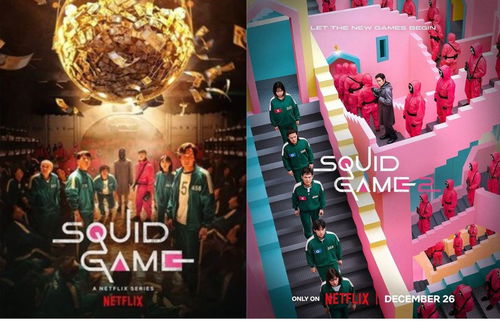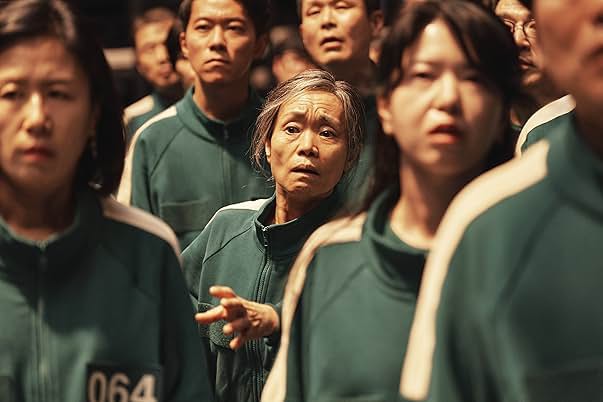Squid Game (Round 6) is a South Korean series that premiered its third and final season on Netflix on June 27, 2025.
Written and directed by Hwang Dong-hyuk.
Starring Lee Jung-jae (Seong Gi-hun/Player 456), Lee Byung-hun (Hwang In-ho / Front Man), and Wi Ha-joon (Hwang Jun-ho/Detective).
Synopsis

Following the events of the second season, where Seong Gi-hun (Lee Jung-jae) uncovers the identity of the Front Man and refuses to turn a blind eye to the deadly games, the third season focuses on his unyielding determination to dismantle the organization behind the competition.
At his lowest after a failed rebellion, Gi-hun must make life-altering decisions as the remaining players are forced into even more dangerous and creative challenges. The story dives deeper into the sinister world of the organization, revealing more about the Front Man and introducing increasingly twisted and elaborate games.
Official Trailer
Squid Game - Previous Seasons Recap

Season 1 (2021): Hundreds of individuals drowning in debt and with no prospects are invited to take part in a mysterious series of children’s games. The prize is life-changing money, but failure leads to death. The protagonist, Seong Gi-hun (Player 456), a divorced father with a gambling addiction, joins in hopes of solving his financial problems and ensuring a better future for his daughter. He forms alliances and confronts the brutal reality of the system.
Season 2 (2024): After surviving the games and uncovering the truth behind them, Gi-hun decides not to board a flight to the United States and instead investigates the organization controlling the competition. This season follows his journey as he seeks answers, with new characters introduced and the storyline expanding beyond the island. Detective Hwang Jun-ho and the Front Man return, and their complex relationship is further explored. The audience witnesses new, extreme challenges pushing participants to their limits.
Personal Review (Spoilers)
In its first two seasons, Squid Game brilliantly introduced new games and compelling characters. From its inception, the series has centered on societal critiques concerning money and the lengths people will go to for it. The first two seasons set a high bar, with a mix of surprises and impactful narratives, and the third season aims to bring this global phenomenon to a conclusive finale.
Though the essence of Squid Game remains intact, the third season offers a conclusion with mixed emotions. Some moments feel dragged, certain characters lack depth, and the pacing occasionally falters. Nonetheless, the series closes its primary storyline in a way that respects its original purpose.

Key highlights from this final season include:
Creative and visually striking games: Staying true to its roots, the third season features games inspired by traditional South Korean childhood activities, executed with precision and supported by excellent production quality. The visual effects, cinematography, and set design immerse viewers in each sequence, enhancing tension and emotional engagement with the competitors.
Thematic depth: The final installment continues its exploration of human greed, systemic inequality, and personal sacrifice. The overarching message underscores the pervasive nature of corruption while also emphasizing that acts of humanity remain possible. Gi-hun’s character arc remains grounded, portraying a deeply flawed yet resolute individual.
Portrayal of the VIPs: The returning VIPs are featured with exaggerated and often cringe-worthy dialogues, breaking the show’s otherwise serious tone. While their lack of empathy and behavior align with their intended roles, the caricature-like representation disrupts the overall immersion and tension of the series.

Underdeveloped characters and hollow deaths: The third season introduces several new characters, but their lack of development makes it hard for the audience to connect with them emotionally. Some deaths feel gratuitous and fail to carry a sufficient emotional weight, undercutting their impact on the overall story.
Pacing issues: At times, the season suffers from overly drawn-out moments, including repetitive voting scenes that slow the flow of the narrative. This results in a less cohesive and occasionally frustrating viewing experience.
Narrative decisions and ending: Gi-hun’s tragic fate feels inevitable within the show’s established themes and dynamics. Though predictable, the ending effectively underscores that the fight against greed and systemic oppression is perpetual. The subplot involving the baby serves as a symbol of hope that endures through personal sacrifices. In interviews, the director Hwang Dong-hyuk disclosed that he had initially imagined a different outcome for Gi-hun.

Final scene: The closing moments of the series see the Front Man observing a recruiter (played by Cate Blanchett) in a Los Angeles alleyway. This scene hints at the global scale of the games and suggests their continuation in other regions of the world. Though the games may have ended in Korea, systems perpetuating them persist elsewhere. This new dimension may pave the way for possible spin-offs exploring different aspects of the Squid Game universe.
In the Netflix special Squid Game in Conversation, director Hwang Dong-hyuk made it clear in a discussion with lead actors Lee Jung-jae and Lee Byung-hun that there are currently no plans for spin-offs or sequels.
Critical Reception
The third season has garnered mixed reviews. While some commend the show for maintaining its social commentary, tension, and dramatic closure of the main arc, others criticize it for straying from its core essence.
Rotten Tomatoes: 78% critic approval, 50% audience approval.
IMDb: 8.0/10 from 683,000 reviews across all three seasons.
Why Watch This Season?

Squid Game remains a powerful critique of social and political inequalities. Its final season deepens these themes, examining extreme wealth disparity, corporate greed, and the desensitization inherent to exploitative systems.
Despite its flaws, the series’ production quality continues to stand out. Beautiful cinematography, intricate art direction, and a powerful soundtrack create an immersive experience that enhances every scene.
For fans of Squid Game, the third season is essential to bringing this story to a close. Whether you agree with its decisions or not, it’s a thought-provoking end to a phenomenon that captivated audiences worldwide.













— Comentarios 0
, Reacciones 1
Se el primero en comentar